Will new tariffs on Asian solar panels and washing machines benefit the U.S.?

The United States has imposed tariffs on solar panels, washing machines, and parts for them coming from China.
One of the stated goals is to stimulate U.S.-based companies, and this might actually work; however, some foreign companies are actually considering moving facilities to the United States to avoid the penalties. Other companies already making solar panels here believe this move will make them more competitive, despite the influx of companies.
Companies such as Whirlpool, which still makes washing machines in the USA, and solar manufacturers Suniva and Solar World Americas, seem to be the most likely to benefit from the tariffs.
The U.S. International Trade Commission (ITC) found that imports were adversely affecting American companies (and employees) because China has been selling “artificially low-priced” solar components inside the U.S., assisted by Chinese state subsidies.

A washing machine is featured at the home appliances section at the booth of South Korean electronics giant Samsung ahead of the opening of the 55th IFA (Internationale Funkausstellung) electronics trade fair in Berlin on September 3, 2015. (JOHN MACDOUGALL/AFP/Getty Images)
According to the BBC, the first 1.2 million imported washing machines will have a 20% tariff imposed in the first year, followed by a 50% tariff on machines above that number. By year three, these tariffs drop to 16% and 40%, respectively.
For solar cells, about 11.5 million panels will be allowed in tariff-free annually. Beyond that, an increase in tariffs the first year will be 30%, falling to 15% by the fourth year.
So why are some opposed to the tariffs?
One large source of opposition comes from the Solar Energies Industry Association (SEIA), which claims that the companies who filed the complaints with the ITC are actually owned by foreign companies, in an attempt to cover for bad business practices.
But the SEIA also represents solar installers, a group which stands to take a large hit from the taxes as less residential and commercial builders opt for solar given the higher prices.
Time will tell whether the tariffs benefit American companies and workers. These kinds of moves can simply cause companies in China to move elsewhere—like Thailand—and begin again.

BAODING, CHINA – JUNE 24: Workers examine the photovoltaic board product at the plant of Tianwei Yingli Green Energy Resources Co., Ltd on June 24, 2009 in Baoding, China. China’s top economic planning agency will soon submit a draft support plan of the country’s new energy industry to the State Council for approval, a plan that would focus on nuclear power and renewable energy as wind and solar power, according to an official of the National Bureau of Energy. (Feng Li/Getty Images)
—





